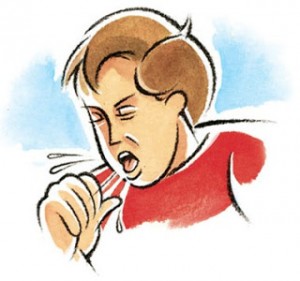 Whooping cough, also known as pertussis, is a respiratory infection caused by bacteria. Whooping cough usually begins with mild, cold-like symptoms which develop over 1-2 weeks into coughing fits which can be severe. The cough can often last for two to three months and because of this whooping cough is known as the “100 day cough” in some countries.
Whooping cough, also known as pertussis, is a respiratory infection caused by bacteria. Whooping cough usually begins with mild, cold-like symptoms which develop over 1-2 weeks into coughing fits which can be severe. The cough can often last for two to three months and because of this whooping cough is known as the “100 day cough” in some countries.
Who can be affected by whooping cough?
Whooping cough most commonly affects infants. Very young babies are at highest risk of serious complications, of needing admission to hospital or of dying from whooping cough. Whooping cough does, however, also occur in older children and adults. In all age groups, apart from children who have recently been vaccinated (those aged from 4 months to around 9 years), the number of cases of whooping cough is currently high across the UK compared to recent years.
How do you catch whooping cough?
Whooping cough is a very infectious disease that is passed from one person to another. The bacteria are present in the back of the throat of an infected person and may be spread by coughing and sneezing.
Symptoms of whooping cough
Early symptoms of whooping cough are similar to a common cold with a runny nose, low fever, sneezing and mild occasional coughing. This progresses after a week to fits of coughing which may be followed by choking and/or vomiting. The cough often comes in short bursts (paroxysms) followed by a desperate gasp for air (when the characteristic whooping noise may be made) and the feeling of not being able to catch your breath. In older children and adults the typical symptoms of whooping is not always present. Between these bouts of coughing, you may feel well but the cough can last for weeks or months. Coughing is worse at night. Over time the episodes of coughing become less frequent and gradually you will fully recover. Infants are most likely to be admitted to hospital because of breathing difficulties. Whooping cough can lead to serious illnesses such as pneumonia, fits, fainting or fractured ribs. It is important to remember that although the symptoms of whooping cough may be mild the infection can be passed on to others in the first few weeks of illness.
Immunisation against whooping cough
Vaccines are the best way to prevent whooping cough. In England and Wales, 800 cases of whooping cough were reported annually with over 300 babies needing admission to hospital and 4 babies dying each year. In the UK, whooping cough vaccine is currently offered to all babies. From this year pregnant women are being offered the whooping cough vaccine from 28 to 38 weeks of their pregnancy. It is recommended that all pregnant women take up this vaccination as it will provide protection to both the mother and baby. It is important for every child under 10 years of age to receive all the doses of whooping cough vaccine recommended for children of their age. If your child has missed any doses of whooping cough vaccine then your GP practice will be able to give them the additional dose/s if they are still under 10 years of age.
I think I/ my child might have whooping cough. What should I do?
If you think you or your child might have whooping cough then you should seek health advice as early as possible. Early diagnosis and treatment can help to reduce the spread of infection to others. It can be quite difficult to diagnose whooping cough because other conditions can also cause an ongoing cough. Whilst whooping cough is often diagnosed from your symptoms or by checking whether you have been exposed to another person with whooping cough, you may be offered tests which can help to confirm the diagnosis.
Treatment
Whooping cough is generally treated with antibiotics. Importantly, whilst antibiotics are unlikely to change your symptoms unless taken very early in the disease (before
coughing starts), they can reduce the likelihood of passing the infection to others.
